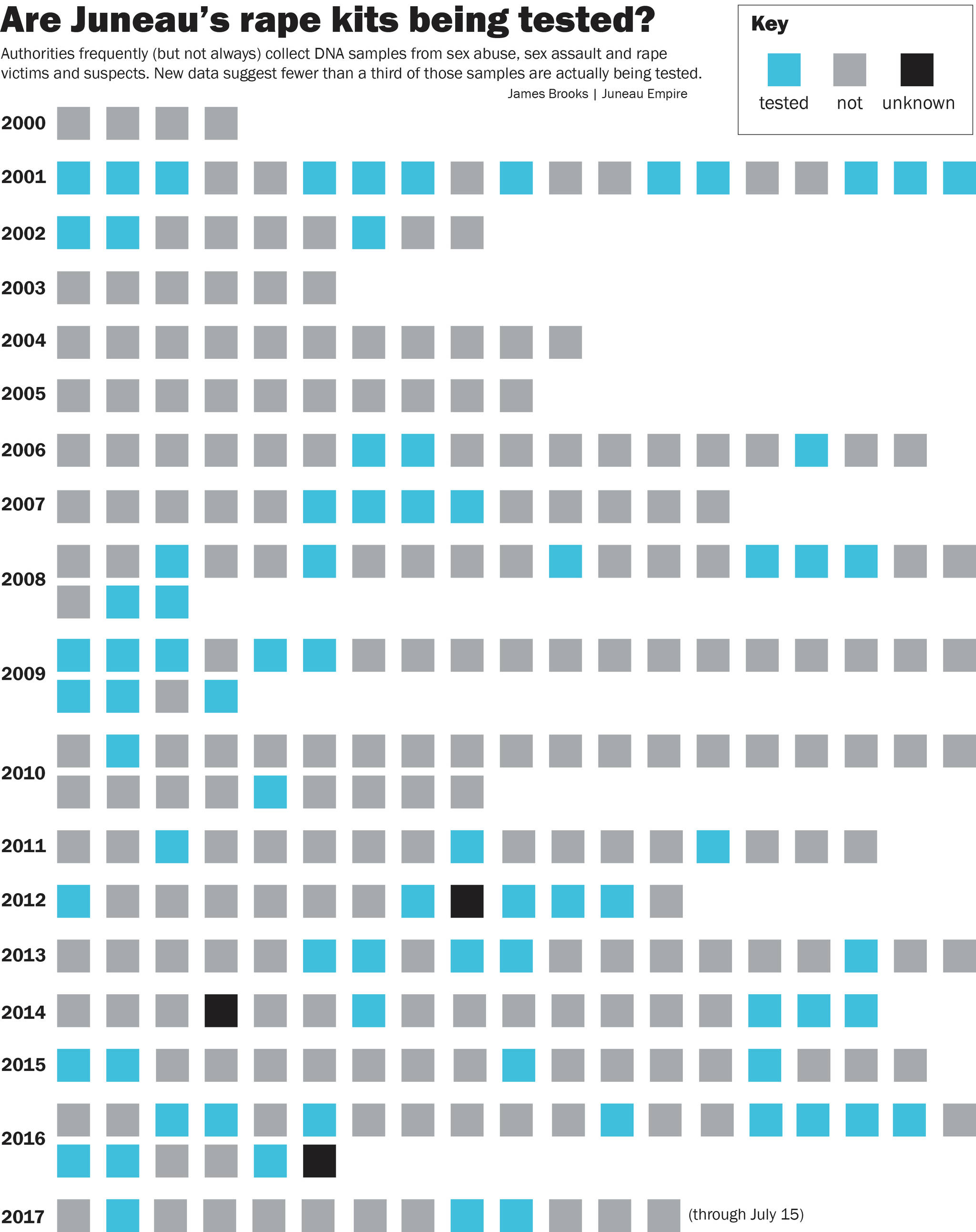Since April, Vanessa Nason has been trying to track rape.
More specifically, the researcher and journalist with the news site MuckRock has been trying to find out what happens across the country when a police department takes physical evidence from a sexual assault or rape. Does that evidence get tested? Does it contribute to prosecution? Or does it sit on a shelf?
She’s sent dozens of information requests to police departments across the country in an effort to track thousands of sexual assault evidence kits, commonly known as “rape kits.”
In late October, she received a response from the Juneau Police Department.
The results were astonishing.
“From the data we’ve seen so far, Juneau is probably the worst city when it comes to testing rape kits,” she said. “Nationwide, it’s one of the worst we’ve seen.”
Between Jan. 1, 2000 and July 14 this year, Juneau police collected physical evidence from 283 sexual assaults. Only 77 were submitted for DNA testing. The remaining 206 — more than 70 percent — remain in storage.
Soon after Nason published a story about the Juneau data, the Alaska Department of Public Safety published a report that counted all untested rape kits in police custody within the 49th state. It found 3,484 — more per capita than any other state in the country, according to the counting of A Joyful Heart Foundation, which tracks such figures.
If Nason ranked Juneau as the worst in her memory, the state’s report found still worse.
Anchorage has one untested kit for every 164 residents. In Juneau, it’s one for every 160 residents. In Nome, where 83 kits have gone untested, it’s one for every 46 residents.
Deputy Attorney General Rob Henderson, head of the criminal section of the Alaska Department of Law, said by phone that there are plenty of reasons why a kit might not be tested.
“A (rape kit) is helpful, but depending upon the actual issue, it may not be determinative,” he said.
If both victim and alleged attacker agree they had sex but disagree whether that sex was consentual, physical evidence can’t help. If the prosecutor declines to take the case, or the victim decides to not press charges, the kit probably won’t be tested.
Victim advocates say that’s a bad strategy. They argue that if all kits are tested, police have a better chance to identify serial rapists.
In 2011, Ohio’s attorney general started an effort to test that state’s 14,000 untested rape kits. In the six years since that effort started, Ohio tested more than 6,800 kits and identified 436 serial rapists in Cleveland’s Cuyahoga County alone. One serial rapist was linked to 17 assaults.
“Someone who commits this crime in Juneau can commit this crime in Massachusetts or Texas,” Nason explained. “It very often connects people to multiple crimes and can connect people to future crimes, too.”
Rep. Geran Tarr, D-Anchorage, was the author of a legislative amendment that resulted in the statewide report earlier this month. She said now that the state knows how big its problem is, it can figure out how to fix it.
“You need a starting place to understand the extent of that problem,” she said. “Now that we have that number … we know what the remaining amount will be and figure out how to test those using state dollars.”
It’s not likely to be cheap. The state report estimates that if all new sexual assault kits were tested, it would cost $454,000 per year. Those are just new kits, however. Clearing the backlog would require $2.2 million to $3 million and several years. The state would have to hire several new workers at the state crime lab or contract the testing out to private labs.
The state has already been awarded federal grants to test kits possessed by the Alaska State Troopers, and money to study why some kits are tested while others are not.
Only 375 of the 764 trooper-held kits will be tested under that grant, however, and competition for federal grant money has become intense as other states ramp up their own testing programs and a cost-cutting Congress prepares to reduce funding.
Deputy Chief David Campbell of the Juneau Police Department said JPD has not yet attempted to pursue grants for its backlog. Using state estimates, Juneau’s backlog would cost as much as $309,000 to erase, and help doesn’t seem likely from the state.
Alaska is facing a $2.7 billion annual budget shortfall, and it has already cut funding for public safety programs as part of an effort to reduce that deficit.
In the meantime, the state is changing some procedures: Police departments are now required to send all rape kits to the state crime lab in Anchorage for collective storage and tracking. Campbell said Juneau started that practice Nov. 1.
Despite the fiscal obstacles facing any effort to reduce the backlog, Tarr said she intends to push the Legislature to reduce or eliminate the backlog.
“I think it should be a near-term priority for sure,” she said.
Contact reporter James Brooks at james.k.brooks@juneauempire.com or call 523-2258.
• Contact reporter James Brooks at james.k.brooks@juneauempire.com or call 523-2258.

